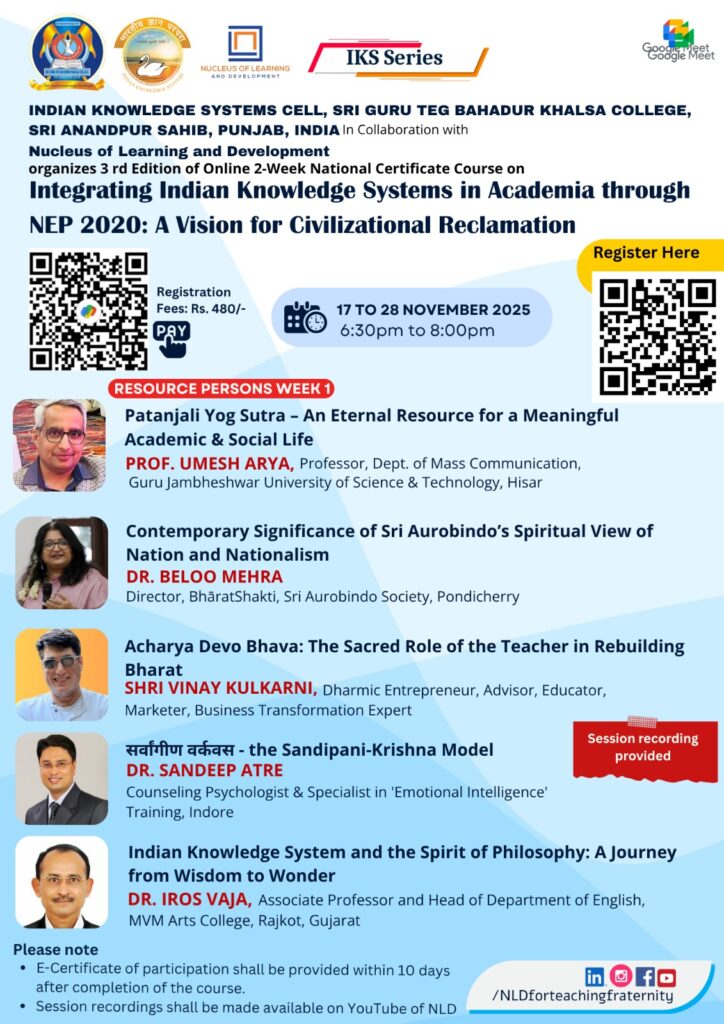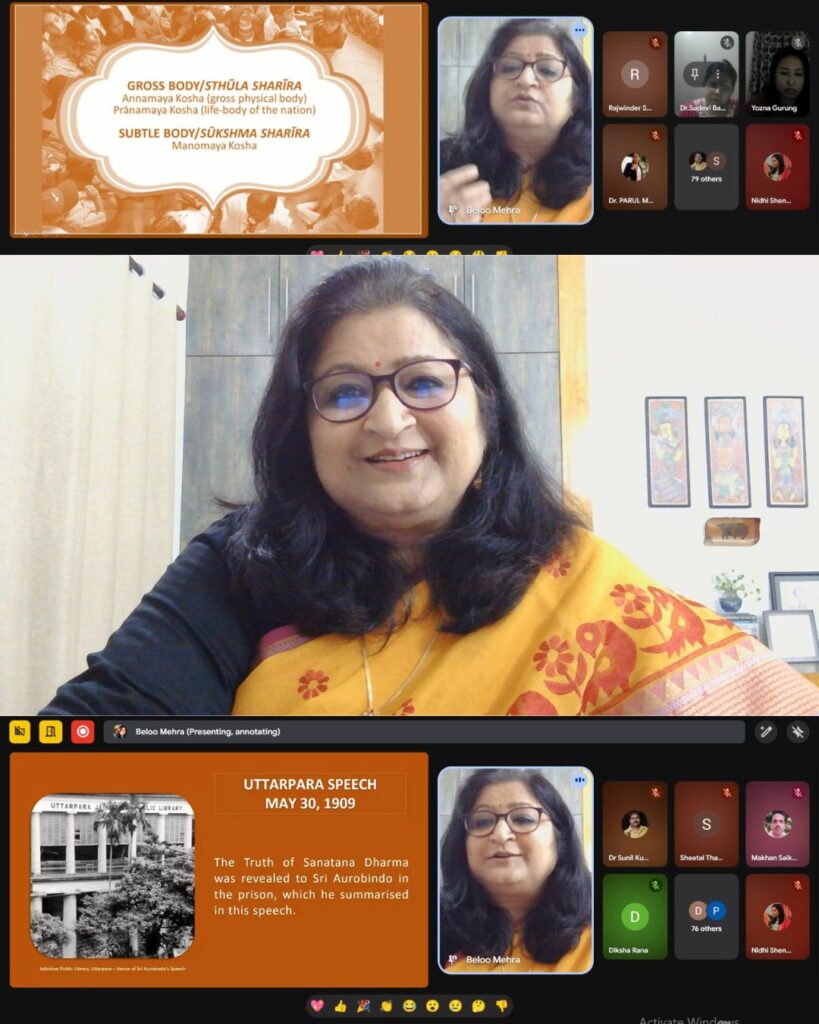Date: November 18, 2025
Venue: Online
Watch the RECORDING.
Indian Knowledge Systems Cell, Sri Guru Teg Bahadur Khalsa College, Sri Anandpur Sahib, Punjab, in Collaboration with Nucleus of Learning and Development organized their Third Edition of Online 2-Week National Certificate Course on “Integrating Indian Knowledge Systems in Academia through NEP 2020: A Vision for Civilizational Reclamation” from 17 to 28 November 2025.
Each of the sessions during this 2-week Certificate Course designed for college and university educators was focused on a different topic delivered by an expert on the subject-matter. As part of this course, Dr. Beloo Mehra, Director, BhāratShakti, was invited to deliver one session on 18th November on the topic – Contemporary Significance of Sri Aurobindo’s Spiritual View of Nation and Nationalism.
About 120 educators had registered for the certificate course. The 1.5-hour-long online session was held at 6:30 PM.

Before starting her talk, at the request of some of the participants, Dr. Mehra gave a brief 10-minute summary of Sri Aurobindo’s phenomenal work as a yogi-revolutionary, highlighting some of the key turning points in his pre-Pondicherry phase. This helped set the context for her discussion on how the deeper insight we get from exploring Sri Aurobindo’s spiritual view of nation and nationalism helps us go beyond politics—and in fact, it helps us reflect on what is the soul of a nation and its role in humanity’s evolution.
Dr. Mehra highlighted that Sri Aurobindo was not just a freedom fighter. He was described as a Poet of Patriotism, Prophet of Nationalism, and Lover of Humanity by his defense lawyer, C. R. Das in his closing argument at the famous Alipore trial. She gave a brief context about the trial.
She highlighted that Sri Aurobindo’s vision of nationalism was deeply spiritual, rooted in India’s eternal values, and the best way to understand that is by exploring two profound questions: What is a Nation? What is its innate genius? For Sri Aurobindo, nationalism was the authentic expression of a nation’s temperament. India, he believed, had a mission—to harmonize religions, philosophies, and sciences, and to uplift humanity.

In the Indian view, Sri Aurobindo explained that a nation is not just land or people. Comparing it to the human being with multiple layers, he spoke about three bodies of a nation – gross body, subtle body and causal body. The land is the physical body; the people form the life-force; Culture, literature, and thought form the subtle body of a nation; and a nation’s causal body is the innate temperament it has developed over a long time period, something that makes the nation unique and distinct from others. There in lies the soul of a nation — the eternal essence unique to itself but also connecting all nations to the Divine, as each nation-soul is one of the many manifestations of that One Supreme Source.
Dr. Mehra highlighted that Sri Aurobindo spoke of nationalism as a divinely appointed Shakti—a force of the Eternal. Its purpose is not aggression but evolution. India’s role is to reawaken her spiritual strength and share it with the world. She also spent time explaining that Sri Aurobindo had clarified that nationalism is not lawlessness or blind extremism. It respects law—but law must grow organically from the nation’s life. Peace and security are not ends in themselves; they must serve the higher purpose of national growth.
Describing who is a true nationalist, Sri Aurobindo said, is a sacred responsibility. It’s not about pride—it’s about serving as an instrument of God for your country’s upliftment. Unity and Equality were important aspects of Sri Aurobindo’s vision of nationalism. His ideal of nationalism was inclusive: essential equality among all because all are parts of the Virat Purusha, thus emphasizing oneness or unity in diversity.

Sri Aurobindo’s message was clear: India must rise not for herself, but for the world. Her freedom is for humanity’s spiritual and intellectual benefit. Our nationalism must be rooted in love, not hatred. He reminded us: Nationalism is not the highest synthesis. Beyond nation lies humanity, and beyond humanity, the Divine. But we must first live as a nation to contribute meaningfully to humanity.
Dr. Mehra emphasised that the new nationalism Sri Aurobindo envisioned was dynamic—reviving India’s ancient spirit in new forms and addressing contemporary challenges and problems faced by the humanity in this deeper light of the spirit. He called for a transformation of ordinary life into a heroic life—the bourgeois into samurai. He emphasised progressing on the path of cultivating the ancient Aryan ideal which was about aspiration, self-conquest, and pursuit of truth and freedom.
Dr. Mehra emphasised some key highlights from Sri Aurobindo’s famous Uttarpara Speech, in which he had shared his own spiritual experiences and what his work meant in that light. He spoke about India existing for Dharma—for the eternal truth. Her rise means the rise of Sanatana Dharma, for the service of the world. Dr. Mehra put the insights from this speech in the deeper context of Sri Aurobindo’s spiritual quest and realization – before his imprisonment and after.

Towards the close of the session, Dr. Mehra spent a few times on highlighted the essential points from Sri Aurobindo’s message broadcast on August 14, 1947, in which he spoke of five dreams: A free and united India; Resurgence of Asia; World unity; India’s spiritual gift to the world; and the next step in evolution of consciousness which would make earthly life divine. She concluded with the thought that Sri Aurobindo had warned against narrow politics. For him, the core work of nationalism was to recover India’s essential thought, character, and energy to solve global problems from an Indian standpoint.
